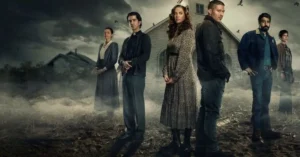Jason Isaacs has shared how much actors made for starring in HBO’s hit show The White Lotus. He called the pay “very low” compared to other big TV shows. Every main cast member, from veterans to newcomers, earned the same flat rate of $40,000 per episode.
The actor, who played Timothy Ratliff in Season 3, confirmed the salary in an interview. He said actors usually avoid talking about pay but admitted this amount was much lower than industry standards. Despite that, he joked that the cast loved the show so much they “would have given a body part” to be in it.
Producer David Bernad explained the equal pay policy started in Season 1 because the show had a tight budget. The rule stayed the same even as The White Lotus became a huge success. Even big stars like Woody Harrelson couldn’t negotiate for more money.
The show’s casting director, Meredith Tucker, said the fixed salary makes hiring easier. Some actors turned down roles because of the pay, but many still wanted to join for the show’s prestige. The policy ensures everyone is treated equally, with billing done alphabetically.
Isaacs, a veteran actor, had no issue earning the same as younger co-stars like Patrick Schwarzenegger. He said he doesn’t work for money and joked about spending everything he’s earned over the years. Other stars like Parker Posey and Walton Goggins also accepted the flat rate.
The White Lotus Season 3 had eight episodes, meaning each actor made $320,000 for the full season. While this is much less than what stars earn on shows like Friends or Game of Thrones, the show’s popularity makes it a career boost.
“Generally actors don’t talk about pay in public because it’s ridiculously disproportionate to what we do — putting on makeup and funny voices — and just upsets the public. But compared to what people normally get paid for big television shows, that’s a very low price.”
— Jason Isaacs
The show’s budget was modest, with Season 1 costing under $4 million per episode. Even now, with rising popularity, salaries haven’t increased. Bernad said the rule is “not negotiable,” ensuring fairness among the cast.
Some actors, like BLACKPINK’s Lisa, joined despite already having huge fame. Others, like Sam Nivola, took on bold scenes without hesitation. The show’s creative freedom and critical acclaim make up for the lower pay.
Fans were surprised to learn about the salaries, expecting bigger paychecks for such a popular show. However, the cast’s enthusiasm suggests the experience was worth more than money. Many actors see it as a chance to work on a high-profile project.
The show’s success proves that equal pay can work in Hollywood. With 43 Emmy nominations and 15 wins, The White Lotus remains one of HBO’s top shows. The policy also removes pay disputes, letting actors focus on their performances.
Isaacs also reflected on his past struggles, like the failure of 2003’s Peter Pan. He told younger co-stars not to stress over a project’s success, as it’s out of their control. His advice highlights why many actors value creative roles over big paychecks.
While $40,000 per episode is low for A-list stars, the show’s impact on careers is huge. Many cast members gain major recognition after appearing in The White Lotus. For them, the exposure is worth more than a higher salary.
The show’s unique pay structure sets it apart in Hollywood. Most big series negotiate individual contracts, leading to huge pay gaps. The White Lotus keeps things simple, ensuring no actor feels undervalued compared to others.
Even with the modest pay, the show attracts top talent. Stars like Michelle Monaghan and Carrie Coon joined knowing the salary was fixed. Their willingness proves the show’s strong reputation in the industry.
The policy also helps newcomers, who get the same pay as established stars. This levels the playing field, giving young actors a fair chance without pay discrimination. Many see it as a positive step for Hollywood fairness.
ALSO READ: Why Did BLACKPINK’s Lisa Get So Little Screen Time in The White Lotus Season 3?
With Season 4 in the works, the pay rule is expected to stay. Fans wonder if rising profits will lead to higher salaries, but for now, the flat rate remains. The show’s success shows that great storytelling outweighs big paychecks.
Credits:Variety.






























